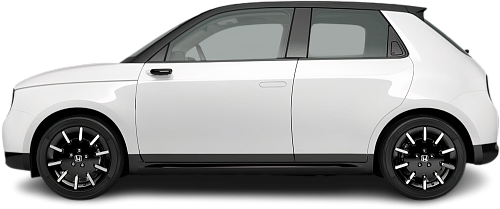Global EV Comparison: Honda e Base vs Seat Mii Electric
Struggling to Decide? Let AI Help!
Your AI Summary Is Ready!
General Info
Since both vehicles have been discontinued, they are now only available on the used car market. You can get the Honda e (2020-2022) for as low as €14900, while the Seat Mii Electric (2019-2021) begins at €11390.
The two vehicles share the same body style: Hatchback.
| Property | Honda e Base | Seat Mii Electric |
|---|---|---|
| Years of Production | 2020-2022 | 2019-2021 |
| Current Status | Discontinued | Discontinued |
| Country of Manufacture | Japan | Slovakia |
| Body Style | Hatchback | Hatchback |
| Market Availability | EU | EU |
| Price Europe (Used) | €14900 | €11390 |
| GCC Score | 4.6 | 4.5 |
Range and Efficiency
The Seat Mii Electric (2019-2021) boasts a greater real-world range, a larger battery, and superior energy efficiency compared to the Honda e (2020-2022).
| Property | Honda e Base | Seat Mii Electric |
|---|---|---|
| Range (WLTP) | 222 km | 259 km |
| Range (GCC) | 189 km | 223 km |
| Battery Capacity (Nominal) | 35.5 kWh | 36.8 kWh |
| Battery Capacity (Usable) | 28.5 kWh | 32.3 kWh |
| Efficiency per 100 km | 15.1 kWh/100 km | 14.5 kWh/100 km |
| Efficiency per kWh | 6.63 km/kWh | 6.9 km/kWh |
| Range and Efficiency Score | 5.7 | 6 |
Charging
Both vehicles utilize a standard 400-volt architecture.
The Honda e (2020-2022) offers faster charging speeds at DC stations, reaching up to 46 kW, while the Seat Mii Electric (2019-2021) maxes out at 40 kW.
The Seat Mii Electric (2019-2021) features a more powerful on-board charger, supporting a maximum AC charging power of 7.2 kW, whereas the Honda e (2020-2022) is limited to 6.6 kW.
| Property | Honda e Base | Seat Mii Electric |
|---|---|---|
| Max Charging Power (AC) | 6.6 kW | 7.2 kW |
| Max Charging Power (DC) | 46 kW | 40 kW |
| Architecture | 400 V | 400 V |
| Charge Port | CCS Type 2 | CCS Type 2 |
| Charging Score | 3.5 | 3.9 |
Performance
The Honda e (2020-2022) is rear-wheel drive, while the Seat Mii Electric (2019-2021) offers a front-wheel drive system.
The Honda e (2020-2022) boasts greater motor power and accelerates faster from 0 to 100 km/h.
| Property | Honda e Base | Seat Mii Electric |
|---|---|---|
| Drive Type | RWD | FWD |
| Motor Type | PMSM | PMSM |
| Motor Power (kW) | 100 kW | 61 kW |
| Motor Power (hp) | 134 hp | 82 hp |
| Motor Torque | 315 Nm | 212 Nm |
| 0-100 km/h | 9 s | 12.3 s |
| Top Speed | 145 km/h | 130 km/h |
| Performance Score | 2.9 | 1.7 |
Dimensions
The Honda e (2020-2022) is longer, wider, and taller.
The Honda e (2020-2022) boasts a more extended wheelbase.
| Property | Honda e Base | Seat Mii Electric |
|---|---|---|
| Length | 3894 mm | 3556 mm |
| Width (w/o Mirrors) | 1752 mm | 1645 mm |
| Height | 1512 mm | 1481 mm |
| Wheelbase | 2538 mm | 2421 mm |
Cargo and Towing
The Seat Mii Electric (2019-2021) provides more cargo capacity, featuring both a larger trunk and more space with the rear seats folded.
Neither car is equipped with a frunk (front trunk).
Neither vehicle is officially rated for towing in in the EU.
| Property | Honda e Base | Seat Mii Electric |
|---|---|---|
| Number of Seats | 4 | 4 |
| Curb Weight | 1588 kg | 1235 kg |
| Cargo Volume (Trunk) | 171 l | 251 l |
| Cargo Volume (Max) | 861 l | 923 l |
| Cargo Volume (Frunk) | - Cargo Volume (Frunk) | - Cargo Volume (Frunk) |
| Towing Capacity | - Towing Capacity | - Towing Capacity |
| Cargo and Towing Score | 3.8 | 3.6 |




